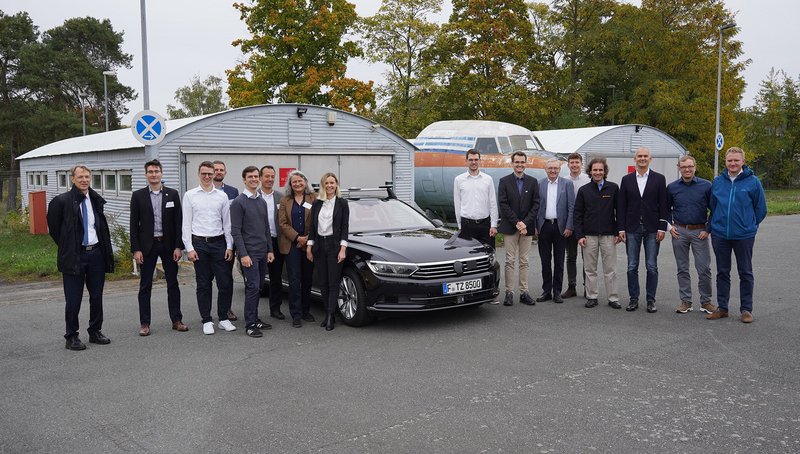From Theory to Practice: Continental Successfully Concludes PRORETA 5 Research Cooperation
- 20 years of PRORETA: Interdisciplinary research between international universities and Continental
- Joint development of advanced driver assistance systems and autonomous driving functions to help prevent traffic accidents
- Research results are used in series vehicles
- Many researchers from the five projects continue their work in development at Continental
Frankfurt, Germany, October 19, 2022. 20 years of research cooperation: Today, Continental presented the results of the fifth and thus final project of the interdisciplinary research cooperation PRORETA with the Technical University of Darmstadt, the University of Bremen (both in Germany) and the Technical University of Iaşi in Romania. Many of Continental's research results from past PRORETA projects have already been further developed to the production stage. For example, in the emergency brake assist or automated driving on the motorway, they are now part of modern vehicles. This shows that cooperation between industry and research helps to develop solutions that support avoiding accidents, taking the load off drivers and making autonomous mobility a reality.
Recognizing complex traffic situations with artificial intelligence
The aim of the PRORETA 5 research project (2019 to 2022) was to investigate artificial intelligence methods for automated driving. Under the motto "Building blocks for automated urban driving enhancing city road safety", it focused on the understanding of the situation and the movement planning of automated vehicles in urban traffic.
The project was dedicated to one of the most demanding tasks for automated driving: the recognition of complex traffic situations in inner cities and the question of how algorithms can derive the right driving decisions in these situations from sensor data. For example, at an unregulated intersection, it can be a challenge to correctly interpret all objects in terms of direction of movement, intent, and priority— without human intervention. In order to create solutions for this, new modules for artificial intelligence were developed as part of the project. Using a vehicle equipped by Continental with sensors and high-performance computers, the researchers were able to test the resulting functional and verification methods for the automated driving system directly under real conditions. Methods included multimodal prediction of dynamic behavior of an object, specifying and testing traffic rule compliance, and logic-based testing to detect unsafe behavior of AI modules.
Joint development of future technologies beyond doctoral thesis
Over the past 20 years and in the course of a total of five PRORETA projects, a large number of researchers have continued their work in development at Continental and supported them in incorporating the research results into concrete solutions such as automated driving on the motorway or automatic emergency brake assist and bringing them into road traffic. Andree Hohm, PhD student at PRORETA 2 and now head of the innovation line "Driverless" in the Autonomous Mobility Business Area at Continental, says: "We conducted research at PRORETA in order to combine knowledge in industry with the competencies of university research and to find solutions for highly demanding problems together with young scientists. The most fascinating about this cooperation: With answers from research, we have laid the foundations for the actual application in the vehicle. What we developed in the first projects can now be seen in road traffic and ensures safety on our roads every day."
An insight into previous stages of exemplary cooperation between Continental and university research:
PRORETA 1 – Accident prevention through autonomous braking and evasion
The first PRORETA project (2002 to 2006) investigated how a vehicle can automatically detect imminent dangers in the form of stationary or retracting obstacles by means of environmental sensors and avert them by emergency braking or emergency evasion. An important research aspect, also for the following projects: Does the driver accept the system interventions?
PRORETA 2 – Prototype of an overtaking driver assistance system
In the second stage (2006 to 2009), the teams researched the prototypes of a driver assistance system that helps the driver prevent accidents during overtaking maneuvers on country roads. For this purpose, a system was developed that uses the sensor and vehicle dynamics data to determine and permanently calculate the position of one's own vehicle, the vehicle in front and the possibly oncoming vehicle in order to determine whether the free distance is sufficient for a safe overtaking maneuver.
PRORETA 3 – Driver assistance system for urban traffic
In the third PRORETA project (2011 to 2014), the implementation of a "safety corridor" as an integral vehicle safety concept was researched in order to increase active safety in urban and rural traffic. The challenges here, the high complexity of urban traffic and the question: What must be the nature of a safety system that detects an obstacle or a sudden danger and carries out active assistance measures such as steering and/or braking interventions so that it is accepted by the driver?
PRORETA 4 – Intelligent learning vehicle systems
In phase four of the PRORETA project (2015 to 2018), the focus was on intelligent learning vehicle systems in order to further increase driving safety and comfort. These assistance systems support the driver in difficult situations such as turning left, entering roundabouts or right-before-left intersections with individual and adaptive recommendations. The systems learn how the driver usually reacts in order to achieve maximum acceptance with targeted interventions.
PRORETA, an overview
PRORETA, named after the chief boatman warning of shoals on ancient Roman ships, pursued several goals: to promote and intensify the exchange of knowledge between industry and university research, to inspire young scientists and to involve them in finding solutions to application-oriented problems at an early stage. In several project stages, impressive results have been achieved in the last 20 years, which can be found on the roads today.

Jennifer Weyrich
Media Spokesperson and Topic Manager Autonomous Mobility
Continental Automotive
(On maternity leave)


